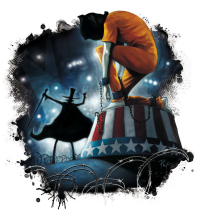
A lot of New Year’s resolutions are that way: it’s like deciding to go on a diet, but only after a few more delicious buffets. Between keeping Gitmo running and rehiring George W. Bush’s secretary of defence, this Obama fellow is quite a neo-con.
But whether it’s now or in a year, Obama’s order may affect Canada, for Gitmo still holds a Canadian, Omar Khadr. Unlike most inmates who were held without charges, Khadr has indeed been charged with a very specific crime: the murder of U.S. Army Sgt. Christopher Speer in Afghanistan. Obama’s executive order isn’t a get-out-of-jail-free card, it’s a move-to-another-jail card: “Some individuals currently detained at Guantanamo may have committed offences for which they should be prosecuted.” The question is: where should they be prosecuted?
That’s a pretty obvious one. Khadr was arrested by Americans and charged with murdering an American. The Americans have the evidence and the Americans have been preparing the case against him. Most obviously, the Americans have been holding him for almost seven years. The only Canadian connection is Khadr’s nominal Canadian citizenship — but that is no legal bar to a U.S. trial.
Khadr’s cheerleaders in the media describe him as a “child soldier,” since he was detained when he was 15. That’s young, even a little younger than George H.W. Bush was when he joined the U.S. Navy after Pearl Harbor, at 18. But both young men were surely old enough to understand what they were doing, and why.
Khadr’s chorus demands that he be treated according to the Geneva Conventions. Good idea. Art. 4 of the Third Geneva Convention, ratified in 1949, has a clear definition of a lawful combatant, and Khadr doesn’t meet it. Art. 4 is pretty liberal; it gives rights not only to soldiers in national armies, but also to “militias and members of other volunteer corps” and “organized resistance movements,” even those “operating . . . outside their own territory, even if this territory is occupied.” But even guerillas have to follow certain basic rules of conduct to distinguish them from mere murderers. They must be part of a chain of command; show a flag or emblem “recognizable at a distance”; carry their arms “openly”; and generally follow the “laws and customs of war.” Khadr needs all four of those to meet the standard of the Geneva Conventions. He has none of them. If Khadr did kill Speer, it was an act of murder, not an act of war.
But all of this is a dainty legal discussion in the midst of a dirty war. When Khadr was detained, it wasn’t by a police department with a CSI team, meticulously preparing a legal case suitable for the U.S. or Canada. He was seized by soldiers armed and trained to fight a war, not dust for fingerprints. To take that Afghan crime scene and transplant it to a North American court with all of its niceties simply doesn’t make sense. Obama’s order turns that absurdity into an inevitability. The only question is: should that circus be held in the U.S., or in Canada?
Other than those who lust for such a circus — lawyers of fortune who smell another Maher Arar-style payday; political crusaders who want to use Khadr to attack the war on terror; anti-American media hounds, etc. — who would want Khadr back? At any given moment, there are about a thousand Canadian citizens stranded in some way around the world. Take Huseyin Celil — a Muslim of Uyghur ethnicity who was designated a refugee by the United Nations and granted citizenship in Canada. While visiting family in Uzbekistan he was seized, spirited to China, and charged with “terrorism” — the Chinese euphemism for Tibetan and Uyghur political dissidents. Despite the requirements of the consular agreement between Canada and China, Canadian diplomats have not been allowed access to Celil, including to his sham trial. China simply refuses to acknowledge Celil’s Canadian citizenship.
Celil is a political prisoner, and Canada wants him back. And he’s Muslim to boot. What a shame that he had the misfortune of being detained in China, and not Guantanamo Bay. The brave press corps that chant for Khadr’s release couldn’t give a damn about Celil — he’s not useful to demonize the U.S. or its war on terror, and he doesn’t fit with the politically correct narrative of a benign China. It makes no legal sense to have his trial up here. It makes no security sense to bring an al-Qaida supporter here.
It makes no financial sense to jail him up here. And it makes no political sense to lift a finger for him, ahead of 999 other Canadians who deserve our help.
Ezra Levant is a Calgary lawyer. He can be reached at [email protected]










